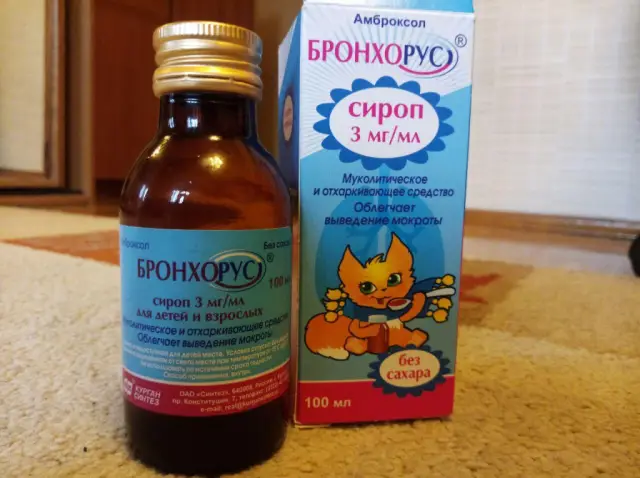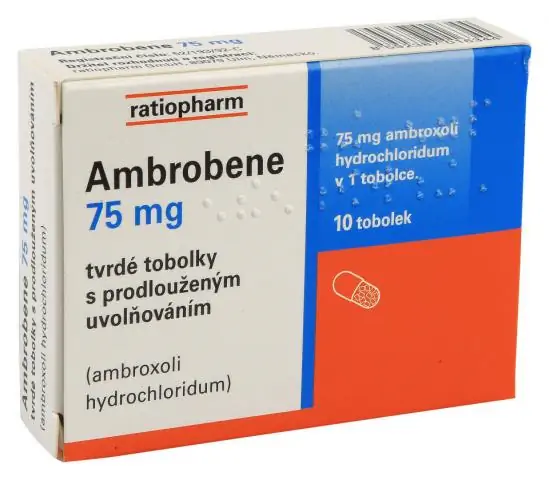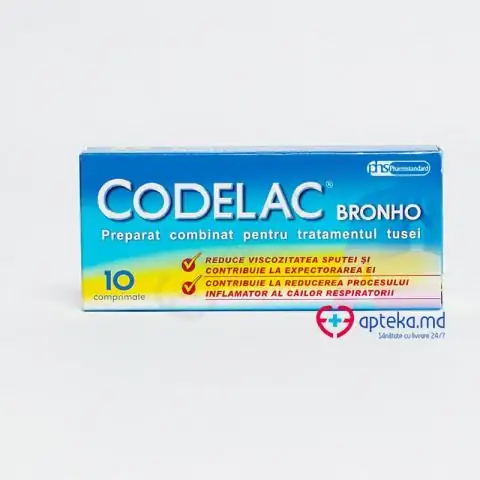- Author Rachel Wainwright wainwright@abchealthonline.com.
- Public 2023-12-15 07:39.
- Last modified 2025-11-02 20:14.
Bronchorus
Bronchorus: instructions for use and reviews
- 1. Release form and composition
- 2. Pharmacological properties
- 3. Indications for use
- 4. Contraindications
- 5. Method of application and dosage
- 6. Overdose
- 7. Side effects
- 8. Special instructions
- 9. Application during pregnancy and lactation
- 10. Use in childhood
- 11. In case of impaired renal function
- 12. For violations of liver function
- 13. Drug interactions
- 14. Analogs
- 15. Terms and conditions of storage
- 16. Terms of dispensing from pharmacies
- 17. Reviews
- 18. Price in pharmacies
Latin name: Bronchorus
ATX code: R05CB06
Active ingredient: ambroxol (ambroxol)
Producer: Sintez, JSC (Russia)
Description and photo update: 2019-26-08
Prices in pharmacies: from 17 rubles.
Buy

Bronchorus is a mucolytic drug with an expectorant effect.
Release form and composition
- tablets: round flat-cylindrical shape, white, with a chamfer (10 pcs. in blisters, in a cardboard box 2 or 5 packs);
- syrup: transparent colorless or yellowish liquid (100 ml in dark glass vials, in a cardboard box 1 bottle complete with a 5 ml measuring spoon or without it).
Each pack also contains instructions for the use of Bronchorus.
1 tablet contains:
- active substance: ambroxol hydrochloride - 30 mg;
- auxiliary components: magnesium stearate, corn starch, lactose, talc.
1 ml of syrup contains:
- active substance: ambroxol hydrochloride - 3 mg;
- auxiliary components: sorbitol, propyl parahydroxybenzoate, raspberry flavor, methyl parahydroxybenzoate, sodium saccharinate dihydrate, propylene glycol, purified water.
Pharmacological properties
Pharmacodynamics
The active substance of Bronchorus is ambroxol - a mucolytic and expectorant agent with a secretolytic and secretomotor action.
Ambroxol has several mechanisms of action:
- stimulates the motor activity of the cilia of the ciliated epithelium of the bronchial mucosa (secretomotor and mucokinetic activity). As a result of peristaltic contractions in a spiral of ciliated cells of the bronchial epithelium, mucus is excreted from the bronchial tree, i.e., mucociliary transport is significantly improved;
- increases the content of the mucous component in the sputum, stimulates the serous cells of the glands of the bronchial mucosa, and also normalizes the disturbed ratio of the mucous and serous components of the sputum;
- activates hydrolyzing enzymes and enhances the release of lysosomes from Clara cells, thereby reducing the viscosity of the secretion and its adhesive properties (secretolytic and mucolytic properties);
- increases the synthesis and secretion of surfactant (surfactant) in the alveoli and bronchi.
Due to the described mechanisms of action, ambroxol significantly reduces the viscosity of sputum and improves its discharge. Begins to act in 30 minutes, the effect lasts for 6-12 hours.
Pharmacokinetics
After oral administration, Ambroxol is well absorbed. The maximum plasma concentration reaches within 2 hours after administration.
It binds to plasma proteins by 80%. Penetrates the blood-brain and placental barriers, excreted in breast milk.
It undergoes metabolism in the liver, resulting in the formation of dibromantranilic acid and glucuronic conjugates.
It is excreted from the body by the kidneys: 90% - in the form of water-soluble metabolites, 10% - unchanged.
The half-life is 7-12 hours, with chronic renal failure it increases, with impaired hepatic function does not change.
Indications for use
The use of Bronchorus is indicated for the following acute and chronic forms of respiratory tract diseases occurring with the formation of viscous sputum:
- pneumonia;
- bronchitis;
- bronchial asthma (in case of difficult sputum discharge);
- chronic obstructive pulmonary disease (COPD);
- bronchiectasis.
Contraindications
- first trimester of pregnancy;
- hypersensitivity to the components of the drug.
In addition, there are separate contraindications for each of the dosage forms of Bronchorus:
- tablets: age up to 12 years; lactose intolerance, glucose-galactose malabsorption syndrome, sucrase-isomaltase deficiency;
- syrup: hereditary fructose intolerance.
The drug should be prescribed with caution to patients with hepatic and / or renal failure, gastric ulcer and duodenal ulcer, in the II and III trimester of pregnancy and during breastfeeding.
Bronchorus, instructions for use: method and dosage
Pills
Bronchorus tablets are taken orally, after meals and washed down with plenty of liquid.
The recommended dosage regimen for patients over 12 years old: 1 pc. (30 mg) 3 times a day, in the absence of the required effect, it is possible to prescribe in a dose of 2 pcs. (60 mg) 2 times a day. For the treatment of severe forms of the disease, an increased dose is maintained throughout the course. Duration of use is 5 days.
It is not recommended to prolong Bronchorus intake without consulting a doctor.
Syrup
Bronchorus syrup is taken orally, during or after meals, with a sufficient (100 ml) amount of liquid, including water, tea or juice.
One measuring (or teaspoon) of syrup (5 ml) contains 15 mg of ambroxol hydrochloride.
For adults and children over 12 years old, an initial dose (during the first 2-3 days of treatment) is recommended - 10 ml 3 times a day, then - in the same dose with a frequency of administration 2 times a day or 5 ml 3 times a day … In the treatment of severe pathologies, the initial dose is not reduced throughout the course.
For the treatment of children under 12 years old, Bronchorus is used only in the form of a syrup.
Recommended dosage regimen for children:
- 5-12 years: 5 ml or 1 scoop 2-3 times a day;
- 2-5 years: 2.5 ml or 1 / 2 the measuring spoon 3 times a day;
- up to 2 years: 2.5 ml or 1 / 2 measuring spoon 2 times a day.
You cannot take the syrup for more than 5 days without a doctor's recommendation.
The use of Bronchorus in children under 2 years of age is possible only under medical supervision.
During the period of treatment, the patient should be provided with an abundant drink.
Overdose
An overdose of ambroxol can manifest itself as nausea, vomiting, diarrhea, and dyspeptic disorders.
If no more than 2 hours have passed since taking the drug, you should induce vomiting and gastric lavage. It is also recommended to eat high-fat foods.
Side effects
- respiratory system: rhinorrhea, dryness of the mucous membranes of the respiratory tract;
- digestive system: rarely - dry mouth, diarrhea, constipation; against the background of long-term therapy in high doses - nausea, vomiting, gastralgia;
- allergic reactions: urticaria, skin rash, angioedema; in some cases - anaphylactic shock, allergic dermatitis;
- other: rarely - headache, general weakness, dysuria, exanthema.
special instructions
The simultaneous use of antitussives that impede the excretion of sputum is contraindicated.
The syrup does not contain sugar, therefore, in diabetes mellitus, it can be prescribed, taking into account that the content of sorbitol and saccharin in 5 ml of syrup corresponds to 0.18 bread units (XE).
The content of sorbitol in the syrup can cause a laxative effect in the patient.
Influence on the ability to drive vehicles and complex mechanisms
During the period of taking Bronchorus, it is recommended to be careful when driving complex mechanisms and vehicles.
Application during pregnancy and lactation
In the first trimester of pregnancy, Bronchorus is contraindicated. In the II and III trimesters, the drug can only be prescribed by a doctor, having previously estimated the expected benefits for the mother and possible risks to the fetus.
Ambroxol is excreted in breast milk, so Bronchorus should be used with caution during lactation.
Pediatric use
In tablets, Bronchorus is contraindicated in patients under 12 years of age.
Bronchorus for children under 12 years of age is prescribed in the form of a syrup, following the recommendations for the dosage regimen. Children under 2 years of age during treatment should be under close medical supervision.
With impaired renal function
Patients who have been diagnosed with renal failure should take Bronchorus with caution.
For violations of liver function
Patients who have been diagnosed with liver failure should take Bronchorus with caution.
Drug interactions
The concomitant use of antitussives leads to a decrease in cough, but makes it difficult for sputum to pass.
Ambroxol enhances the penetration of cefuroxime, amoxicillin, doxycycline, erythromycin into the bronchial secretions.
Analogs
Analogues of Bronhorus are: Ambroxol, Ambroxol Vramed, Lazolvan, Ambrobene, etc.
Terms and conditions of storage
Store in a dark place at a temperature: tablets - up to 25 ° C, syrup - 15-25 ° C. Store tablets in a dry place. Keep out of the reach of children.
The shelf life is 3 years.
Terms of dispensing from pharmacies
Available without a prescription.
Reviews about Bronhorus
Reviews about Bronchorus are mostly positive. Patients note its high efficiency, availability and low cost.
Bronchorus syrup is often prescribed to children for the treatment of cough with viscous sputum difficult to separate. As the parents write, the drug liquefies phlegm and improves its coughing up, while not helping to increase bronchial secretions. Bronchorus reduces bronchial obstruction, is well tolerated and causes almost no side effects. It also has a mild anti-inflammatory effect. With the simultaneous appointment of an antibiotic (for example, cefuroxime, erythromycin, doxycycline or amoxicillin), it enhances its penetration into the bronchial mucosa, which increases the effect of antibiotic therapy. In addition, the syrup has a pleasant raspberry flavor, so children enjoy drinking it.
There are reports in which patients note the lower effectiveness of ambroxol compared to acetylcysteine, which retains its activity not only with mucous sputum, but also with mucopurulent and purulent secretions.
Price for Bronchorus in pharmacies
Approximate prices for Bronhorus: 30 mg tablets, 20 pcs. in the package - 15-23 rubles; syrup 3 mg / ml, bottle 100 ml - 44-60 rubles.
Bronchorus: prices in online pharmacies
|
Drug name Price Pharmacy |
|
Bronchorus 30 mg tablets 20 pcs. RUB 17 Buy |
|
Bronchorus 30mg tablets 30 pcs. RUB 33 Buy |
|
Bronchorus 30 mg tablets 30 pcs. RUB 33 Buy |
|
Bronchorus 3 mg / ml sugar-free syrup 100 ml 1 pc. 41 rbl. Buy |
|
Bronchorus syrup 3mg / ml 100ml RUB 50 Buy |

Maria Kulkes Medical journalist About the author
Education: First Moscow State Medical University named after I. M. Sechenov, specialty "General Medicine".
Information about the drug is generalized, provided for informational purposes only and does not replace the official instructions. Self-medication is hazardous to health!






